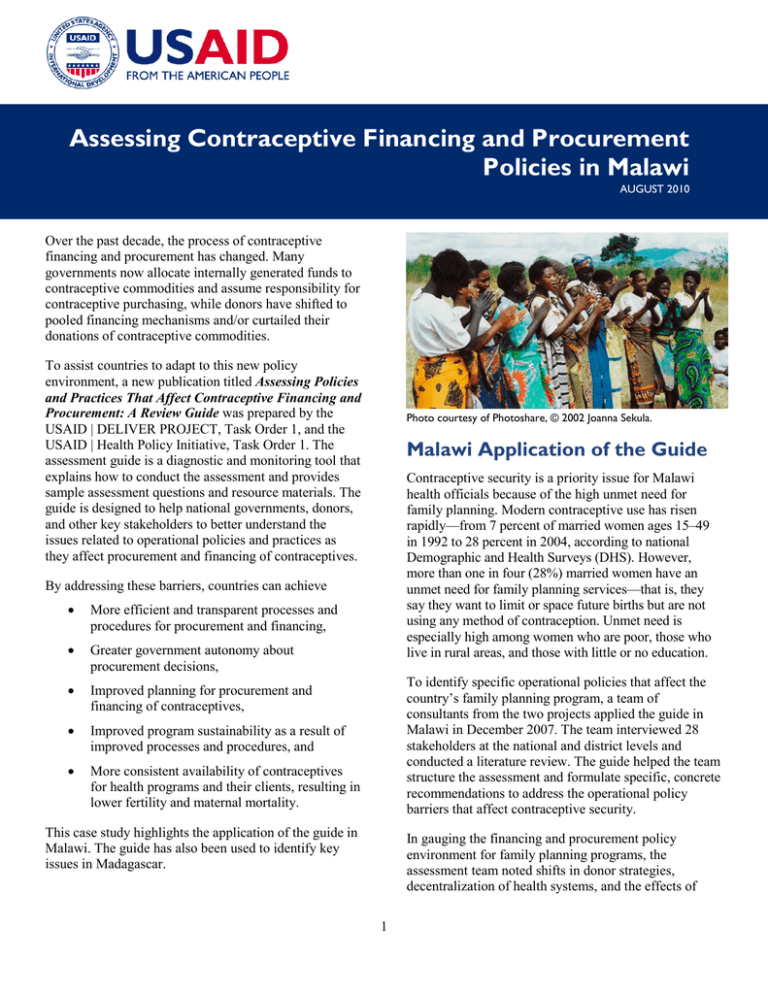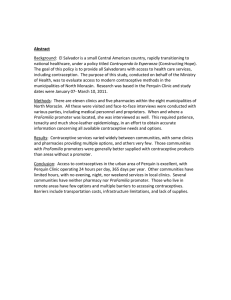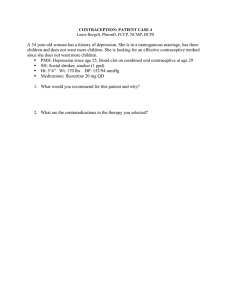Assessing Contraceptive Financing and Procurement Policies in
advertisement

Assessing Contraceptive Financing and Procurement Policies in Malawi AUGUST 2010 Over the past decade, the process of contraceptive financing and procurement has changed. Many governments now allocate internally generated funds to contraceptive commodities and assume responsibility for contraceptive purchasing, while donors have shifted to pooled financing mechanisms and/or curtailed their donations of contraceptive commodities. To assist countries to adapt to this new policy environment, a new publication titled Assessing Policies and Practices That Affect Contraceptive Financing and Procurement: A Review Guide was prepared by the USAID | DELIVER PROJECT, Task Order 1, and the USAID | Health Policy Initiative, Task Order 1. The assessment guide is a diagnostic and monitoring tool that explains how to conduct the assessment and provides sample assessment questions and resource materials. The guide is designed to help national governments, donors, and other key stakeholders to better understand the issues related to operational policies and practices as they affect procurement and financing of contraceptives. Photo courtesy of Photoshare, © 2002 Joanna Sekula. Malawi Application of the Guide Contraceptive security is a priority issue for Malawi health officials because of the high unmet need for family planning. Modern contraceptive use has risen rapidly—from 7 percent of married women ages 15–49 in 1992 to 28 percent in 2004, according to national Demographic and Health Surveys (DHS). However, more than one in four (28%) married women have an unmet need for family planning services—that is, they say they want to limit or space future births but are not using any method of contraception. Unmet need is especially high among women who are poor, those who live in rural areas, and those with little or no education. By addressing these barriers, countries can achieve • More efficient and transparent processes and procedures for procurement and financing, • Greater government autonomy about procurement decisions, • Improved planning for procurement and financing of contraceptives, • Improved program sustainability as a result of improved processes and procedures, and • More consistent availability of contraceptives for health programs and their clients, resulting in lower fertility and maternal mortality. To identify specific operational policies that affect the country’s family planning program, a team of consultants from the two projects applied the guide in Malawi in December 2007. The team interviewed 28 stakeholders at the national and district levels and conducted a literature review. The guide helped the team structure the assessment and formulate specific, concrete recommendations to address the operational policy barriers that affect contraceptive security. This case study highlights the application of the guide in Malawi. The guide has also been used to identify key issues in Madagascar. In gauging the financing and procurement policy environment for family planning programs, the assessment team noted shifts in donor strategies, decentralization of health systems, and the effects of 1 negative influence on public health priorities. Prior to 2005, most contraceptives were donated by international agencies. The Central Medical Stores (CMS) managed and distributed contraceptive commodities. For donated products, the districts do not pay for the cost of the product but only the 5 percent handling fee. However, in 2005, the government of Malawi began procuring injectable contraceptives using government basket funds, and districts had to pay for both the cost of the product and a 12 percent handling fee. At the time of the assessment, the impact of the new costs on injectables supplies was unknown. Nevertheless, the assessment team predicted that the shift from donated drugs might lead districts to stop purchasing injectables because they might be seen as “too expensive.” Accordingly, the increased price might make the supply of injectables vulnerable at the district level and service delivery points. Photo courtesy of Margot Fahnestock unbudgeted costs. In late 2004, Malawi implemented the Sector-Wide Approach (SWAp) and a related government basket finance mechanism for its health sector. In 2005, the country began decentralizing its government structure, with separate public funding allocated to 28 districts. These health sector reform efforts are positive steps in increasing government leadership, harmonizing health strategies, and devolving decisionmaking to a level closer to the client. However, the assessment team identified some unintended consequences of these initiatives: they made it more difficult for decisionmakers to prioritize family planning, thus putting contraceptive security at risk. To address operational barriers to financing contraceptives, the assessment team recommended that family planning stakeholders routinely update information on ordered contraceptives and ensure that information on donated contraceptives and basketfunded contraceptives be shared so that stakeholders can understand the total funding and contraceptives available. In regard to forecasting and procurement, the assessment team recommended that central and district staff continue to strengthen their capacity to forecast health commodity requirements and track consumption and that the CMS adopt processes to shorten and streamline the procurement process. It also recommended that the CMS and SWAp partners consider establishing a buffer stock of contraceptives to ensure continuity as CMS transitions to a new structure. To clarify roles, the team recommended that the Ministry of Health (MOH) develop guidelines to delineate procurement responsibilities between the CMS and the MOH headquarters’ procurement unit. The team also recommended that the Technical Working Group that provides SWAp oversight to CMS hold regularly scheduled meetings. Basket funding for health. At the central level, the SWAp bundles all health funding together, forcing policymakers to make tradeoff decisions among health issues—often prioritizing curative above preventive programs such as family planning. In addition, the national government has had difficulty implementing the lengthy, structured procurement procedures and process reviews required under the SWAp agreement. Delays in the procurement process led to a shortage of injectables in 2006 and 2007. This shortage was especially serious because injectables are by far the most popular method. Three in five (64%) women using modern contraceptives use injectables, according to the 2004 DHS. The assessment guide was instrumental to identifying the key barriers to contraceptive security because of its detailed questions on key topics such as financial commitment and budgeting, issuance of tenders, and decentralized procurement systems. The comprehensive review of structures and procedures helped the team to collect information efficiently and give close attention to problem areas. Effects of decentralization. At the district level, despite general improvements in district-level financing under decentralization, the assessment team found that financing of contraceptives remained a challenge. Policies related to financing contraceptives were not uniform, creating management challenges and having a 2 What Happened After the Assessment? Malawi’s Current Policy Environment Two years after the assessment, Malawi still faces serious challenges in achieving contraceptive security. Districts continue to pay Central Medical Stores for the unit cost of injectables plus a 12 percent handling fee for non-donated products. As a result, as predicted by the assessment, districts find costs of injectables prohibitive, and they have gradually stopped purchasing them from CMS. Due to the drop in orders from districts, CMS staff stopped ordering injectables even though some service delivery points have experienced shortages. In 2009 and 2010, the MOH Reproductive Health Unit requested emergency procurements of injectables from the U.S. Agency for International Development (USAID) and the United Nations Population Fund (UNFPA). Because of the progress made in Malawi in increasing the contraceptive prevalence rate and the popularity of injectable contraceptives among clients, neither donor could ignore requests from the government to supplement supply. Photo courtesy of Photoshare, © FPLM/JSI. value of the commodity, and implants have high unit costs. The assessment tool enables stakeholders to identify such issues and seek solutions in a timely manner. Resources Since this situation developed, key stakeholders in Malawi have taken several steps to raise awareness about this issue among decisionmakers and advocates. A group of stakeholders, including the USAID | DELIVER PROJECT and the Management Sciences for Health/ Community-Based Family Planning and HIV/AIDS Services project, have used findings from the 2007 policy assessment to raise awareness about the unintended consequences of some of the policies and initiatives to the Sexual and Reproductive Health Technical Working Group as well as the Drugs and Medical Supplies Technical Working Group. In support of the country’s commitment to maternal health and family planning programs, these stakeholders proposed that the Treasury should “zero rate” the commodity cost and the 12.5 percent handling fee for products procured using basket funds. In other words, the Treasury would pay CMS for these costs so that districts would not have to pay them. For other commodities donated by UNFPA, USAID, and others, the donors would pay the 5 percent handling fee for these products. To access the guide, Assessing Policies and Practices That Affect Contraceptive Financing and Procurement: A Review Guide: http://www.healthpolicyinitiative.com/Publications/Docume nts/1170_1_FG_USAID_Contra_6_1_single_acc.pdf Application of the guide in Madagascar: Analysis of the Operational Policies Related to Financing and Procuring Contraceptives in Madagascar: http://www.healthpolicyinitiative.com/Publications/Docume nts/1082_1_Madagascar_CS_FINAL_03_10_10_accpdf.pdf Health Policy Initiative and DELIVER Project. 2008. Analysis of the Operational Policy Barriers to Financing and Procuring Contraceptives in Malawi. Washington, DC: Health Policy Initiative, Constella Futures; and Arlington, VA: DELIVER Project, John Snow, Inc.: http://www.healthpolicyinitiative.com/Publications/Docu ments/519_1_Malawi_CS_Findings_Report_FINAL_6_2 7_08.pdf Procurement Capacity Toolkit: Tools and Resources for Procurement of Reproductive Health Supplies: www.path.org/publications/details.php?i=1652 Strategic Pathway to Reproductive Health Commodity Security (SPARHCS): www.maqweb.org/sparhcs/ The issues identified by the assessment team regarding financing of injectables may also arise regarding district purchases of contraceptive implants. Currently, implants are a donated commodity and therefore are subject to a 5 percent handling fee. Normally this handling fee would not pose a major problem, but the fee is based on the 3 For more information, please visit http://www.healthpolicyinitiative.com and deliver.jsi.com USAID | Health Policy Initiative, Task Order 1 Futures Group One Thomas Circle, NW, Suite 200 Washington, DC 20005 USA Tel: (202) 775-9680 Fax: (202) 775-9694 Email: policyinfo@futuresgroup.com http://ghiqc.usaid.gov http://www.healthpolicyinitiative.com USAID | DELIVER PROJECT John Snow, Inc. 1616 Fort Myer Drive, 11th Floor Arlington, VA 22209 USA Phone: 703-528-7474 Fax: 703-528-7480 Email: askdeliver@jsi.com Internet: deliver.jsi.com The USAID | Health Policy Initiative, Task Order 1, is funded by USAID under Contract No. GPO-I-01-0500040-00, beginning September 30, 2005. Task Order 1 is implemented by Futures Group, in collaboration with the Centre for Development and Population Activities (CEDPA), White Ribbon Alliance for Safe Motherhood (WRA), and Futures Institute. The USAID | DELIVER PROJECT, Task Order 1, is funded by the U.S. Agency for International Development under contract no. GPO-I-01-06-00007-00, beginning September 29, 2006. Task Order 1 is implemented by John Snow, Inc., in collaboration with PATH, Crown Agents Consultancy, Inc., Abt Associates, Fuel Logistics Group (Pty) Ltd., UPS Supply Chain Solutions, The Manoff Group, Inc., and 3i Infotech. The views expressed in this publication do not necessarily 4 reflect the views of USAID or the U.S. government.

